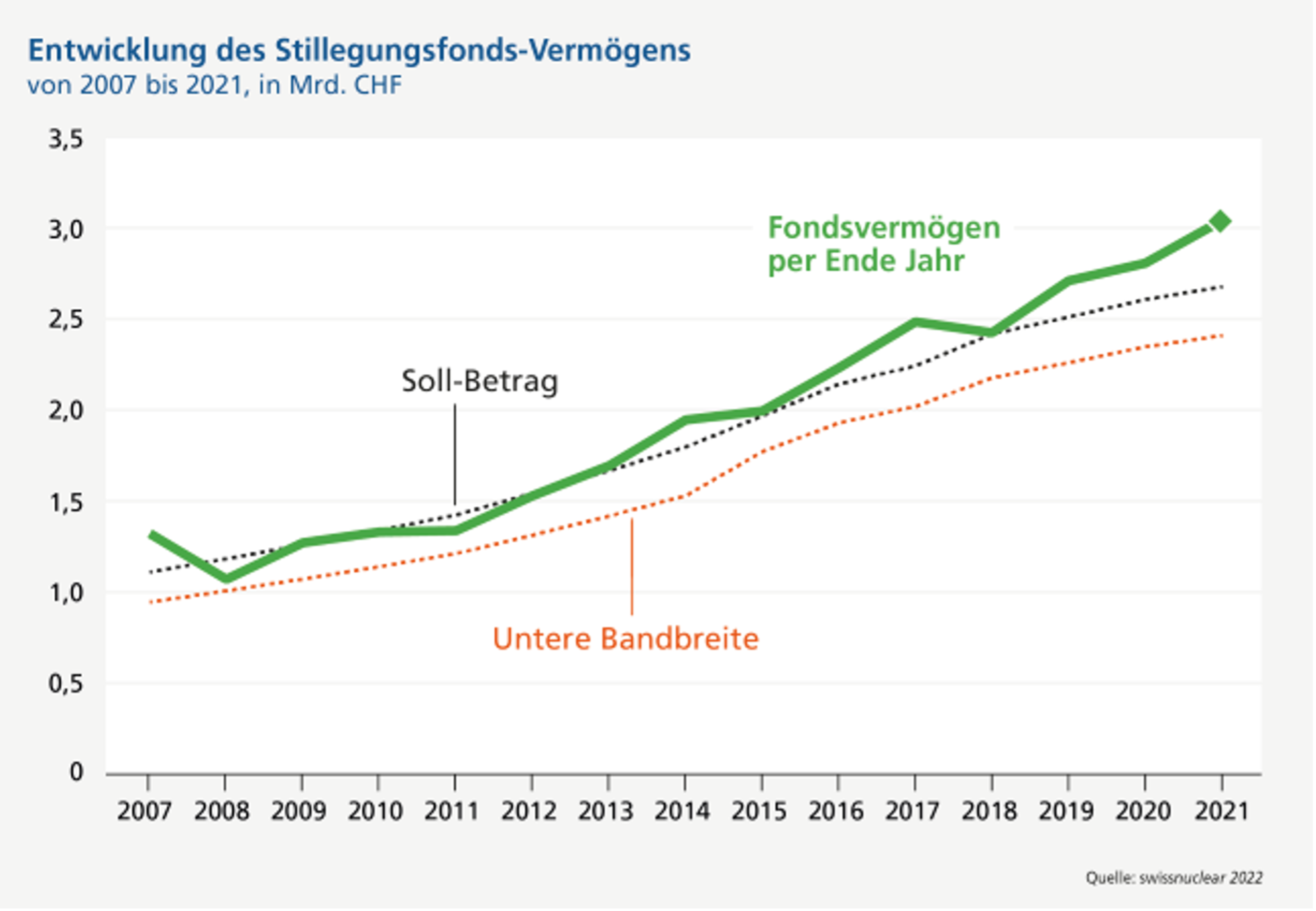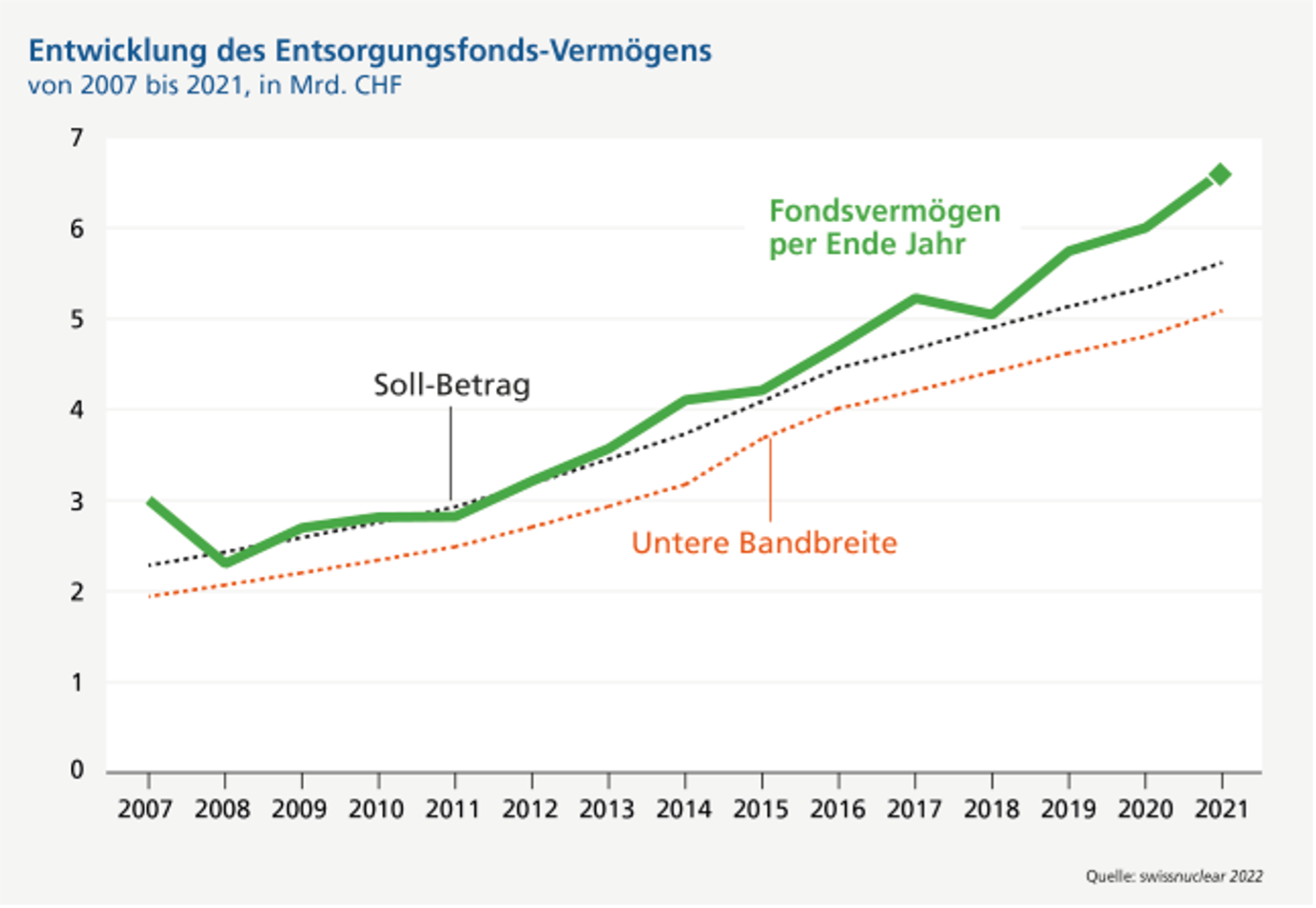Four nuclear power plants are in operation in Switzerland:
The Mühleberg nuclear power plant (boiling water reactor), which was commissioned in 1972, was shut down in 2019 and has since been dismantled.
The Federal Nuclear Energy Act (KEG) does not provide for any lifetime restrictions for nuclear power plants. A nuclear power plant may be operated as long as it meets the legal safety requirements. The operator is responsible for the safety of its plant. The supervisory authority, the Swiss Federal Nuclear Safety Inspectorate (ENSI), monitors the plants on an ongoing basis, determines possible adjustment measures and their implementation and can also order a shutdown if safety is no longer assured.
Over the long term, the funds have developed in line with the target amount defined by the authorities. Thanks to the five-yearly cost studies, the adjustment of the annual contributions paid by the owners of the nuclear facilities as required and a responsible investment strategy, they are on track.


The cost studies are carried out cautiously and to the best of our expert knowledge in the light of current knowledge. This also includes assumptions about the timing of future costs and the estimation of any risk costs. Account is also taken of the unavoidable forecast uncertainties in the estimate. All these cost estimates take into account the fact that the level of technical knowledge and international experience in decommissioning and waste disposal projects is constantly increasing. The uncertainties, on the other hand, are constantly decreasing. In addition, the cost studies are updated every five years. The cost risk therefore becomes smaller and smaller over time.
If unforeseen additional costs nevertheless arise, the owners of the nuclear facilities bear the risk. If one owner becomes insolvent, the other owners are required by law to make additional contributions. The state is only at the end of the five-stage cost-bearing cascade. Only when these additional contributions are not economically viable for an owner does the Federal Assembly decide whether and to what extent the federal government should contribute to the costs.
The funds' payment plan is based on an assumed operating life of the nuclear power plants of 50 years.
In the event of an early definitive decommissioning of a plant, the owner will be treated in the same way when calculating the contributions from 2024 as if he had only decommissioned his plant after 50 years of operation: the contributions will be spread over 50 years. The owners must cover the entirety of the calculated decommissioning and disposal costs with their contributions, regardless of the duration and amount of energy produced.
The investment strategy is determined by the commission of the two funds appointed by the Federal Council, based on the requirements of the Decommissioning and Waste Disposal Ordinance (SEFV). Since 2020, the SEFV has stipulated an average real return of 1.6% per year as the basis for calculation. An operating life of 50 years is assumed for the nuclear power plants.
Investment activities are monitored on an ongoing basis by the Commission's Investment Committee, which is made up of financial experts appointed by the Confederation and those of the owners and is supported by an investment controller. The annual financial statements of the funds are also audited annually by an external auditor and published publicly.
The two funds are geared towards an extremely long-term investment horizon, as payments are only made once the nuclear power plants have been definitively decommissioned.
The PEGASOS study (Probabilistic Earthquake Hazard Analysis for Nuclear Power Plant Sites in Switzerland) was initiated in 1999 by the Swiss Federal Nuclear Safety Inspectorate (ENSI) in order to incorporate scientific progress into engineering practice.
With the PEGASOS project, Switzerland has broken new ground in Europe. This project and the subsequent refinement mean that the seismic hazard of all Swiss nuclear power plants is determined according to the latest knowledge and the most up-to-date data, while conservatively taking into account the uncertainties that always exist.
The findings developed as part of PEGASOS and the subsequent refinement project are gradually improving the quality of the hazard analyses. New findings and earthquake data will also be taken into account by the nuclear power plant operators in the future and incorporated into the updating of the seismic hazard.